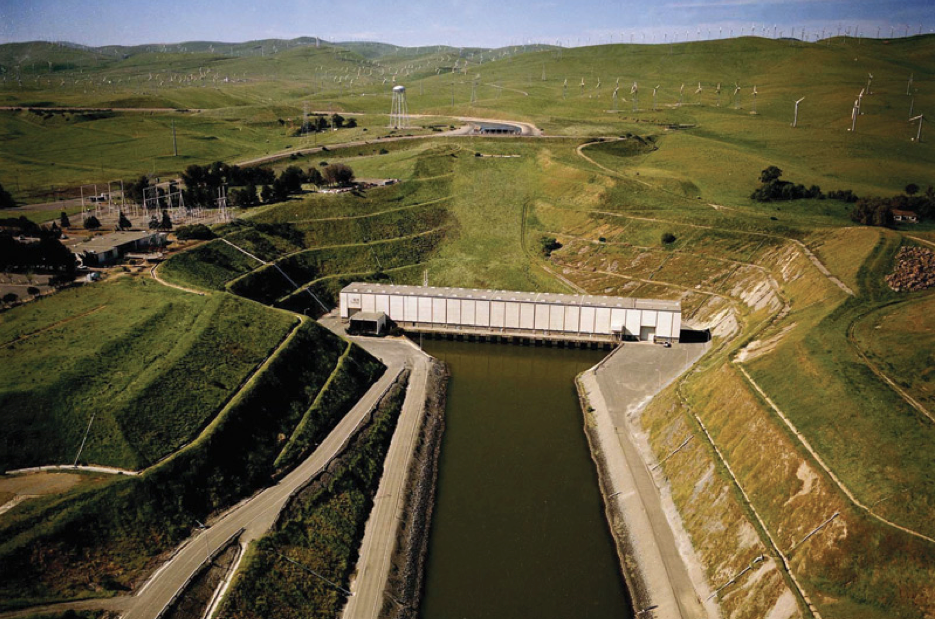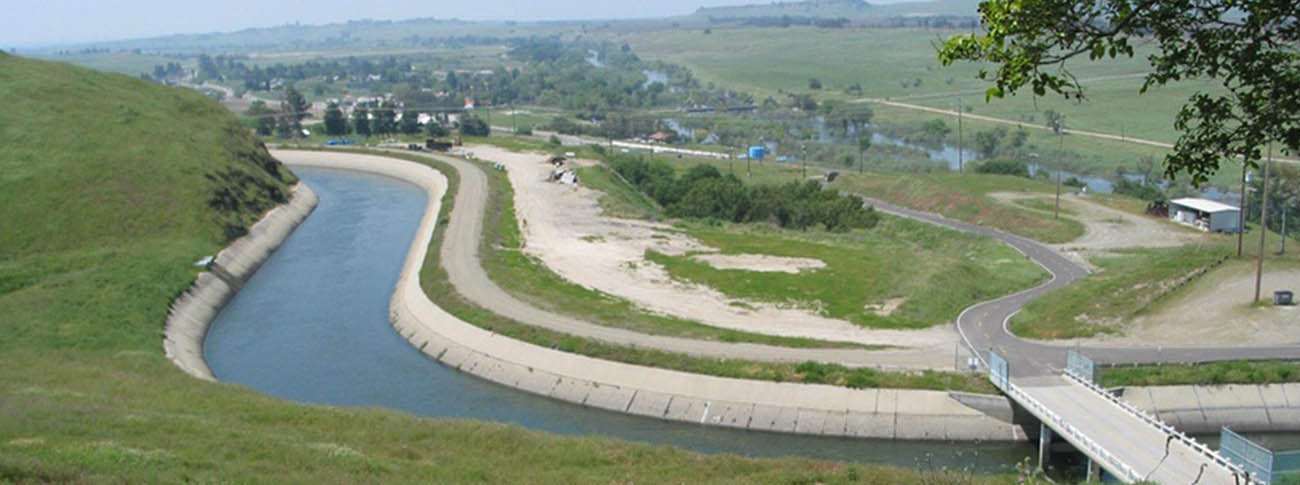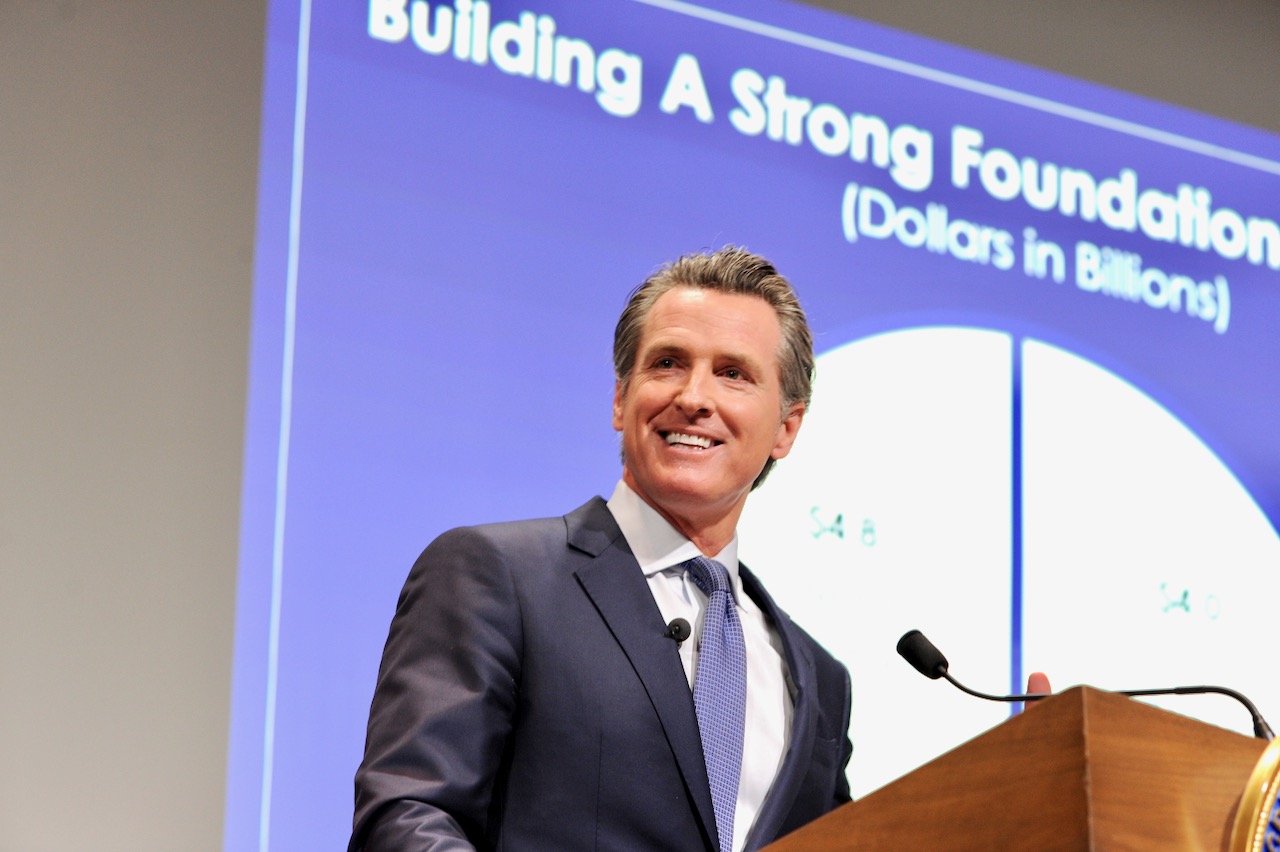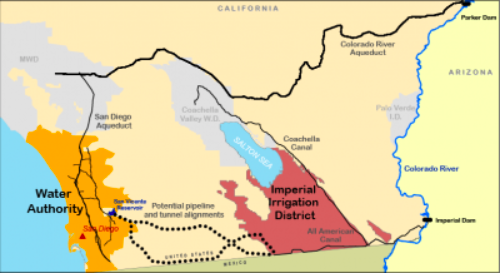
Harvey O. Banks Pumping Plant. (Photo: State Water Project)
Enviros and GOP Oppose Gov. Newsom Having Fish Agency Divvy Out Farmers’ Water
Does the back end of Newsom’s new water deal contain a surprise in a dry year?
By Wayne Lusvardi, April 14, 2020 3:17 pm
The true test of Newsom’s “use-some-water/take-some-fish” water deal (called Incidental Take Permit) is will water be diverted to Los Angeles in a dry year, thus subverting Pres. Trump’s allocation of Federal water to farmers?
Environmentalists and farmers both oppose California Gov. Gavin Newsom’s new water deal, bureaucratically called the “Incidental Take Permit” policy for the long-term management of the State Water Project. One might think that a new method of allocating farm water that provides some water for farmers and cities and allows them to only incidentally “take” a few fish would be supported by both farmers, water contractors and environmentalists. But most are not pleased with what is called a political triangulation strategy crafted by the Democrat governor.
Triangulation
Newsom is being accused of political triangulation by environmentalists. Political triangulation is when a politician positions policy as above both right and left sides of an issue to neutralize the opposing party at the expense of alienating his own party. But does the back end of Newsom’s new water deal contain a surprise in a dry year?
To Republicans Newsom’s policy is like allowing a fox (State Fish and Wildlife – DF&W) to manage the henhouse. Who would believe that an agency that issues fishing permits would end up with the power to allocate water to farmers and cities over the Department of Water Resources? So Republican Congressmen Kevin McCarthy, Devin Nunes, Ken Calvert, Tom McClintock, Doug LaMalfa and Paul Cook sent a letter to Newsom opposing his Incidental Take Permit Policy.
Some Farmers Like the Newsom Deal
Farmer Wayne Western sees the new Incidental Take Permit policy as creating chaos.
Western says environmentalists wanted the number of fish that could be taken to be “zero”, preserving for them enormous power over farmers and thirsty cities in Southern California. Western points out that without the power to shut down water purportedly to save a few fish, there no longer is any reason for the existence of such environmental advocacy organizations. And there is no reason to raise the huge sums of money these organizations depend on.
Western is encouraged by the recent April 7 action of Obama appointed U.S. District Court Judge Dale Drozd denying a restraining order to stop Delta pumping to farmers for about one week requested by the National Resources Defense Council (NRDC), Defenders of Wildlife and the Golden Gate Salmon Association (see Pacific Coast Federation of Fishermen’s Associations v. Wilbur Ross -Secretary of Commerce, April 7, 2020). If the NRDC had gotten their way 35,000 acre-feet of water would have been diverted from farmers to the Pacific Ocean.
A 2007 Wet Drought brought about……
The NRDC had previously used a lawsuit in 2007 to shut down water, purportedly to save a few Delta Smelt fish. This ended up creating what was called a “wet drought” because it was a wet year. In reaction, the Metropolitan Water District of Southern California (MWD) proposed to build water conveyance tunnels under the Delta that did not trap fish so that water could not again be shut down to millions of people even in a wet year.
…….the MWD Twin Tunnels Project
The MWD, and other state water contractors, were willing to spend a gargantuan $20 billion to stop such legalized environmental extortion. Jeff Michael, a University of Pacific economist retained by Save The Delta, claimed in 2016 that the then $15 billion estimated cost of the tunnels made the project infeasible. But Michael didn’t acknowledge that cost was less a concern than having no imported water at all.
The State Water Contractors (see map here) are opposed to the new Incidental Take Permit because they see in it that water allocations would be arbitrary instead of more predictable under the previous Federal-State allocation system.
But What Happens in a Dry Year?
Water is normally diverted from farmers to cities during droughts. But what is unclear in Newsom’s Incidental Take Permit policy is what happens to Trump’s allocation of Federal water for farmers in a dry year?
2018 was a drier year and 2019 a wetter year, but 2020 has been a drier year so far.
In January, 2020, Pres. Trump increased California’s imported dry-year water allocations to farmers flowing through the Federal Central Valley Project (CVP). What Newsom’s Incidental Take Permit does is potentially take away dry-year water from farmers.
The Department of Fish and Wildlife’s 140-page Incidental Take Permit document has so many contingencies in it that it is difficult to assure farmers, or cities, what their water allocation would be in a dry year. Table 9-A of the document provides that following a dry year water conveyance will operate for only 30 days. The moment of truth for Newsom’s Incidental Take Permit policy is when drought returns.
Note: The original version of this article was corrected and revised at the request of Wayne Western.
- Peter Gleick’s National Water Plan for California - October 12, 2020
- Court Opens Up Big Prop.13 Loophole for ‘Public Franchise Fees’ - October 2, 2020
- New Cal Grid CEO is Ex-Enron Green Power Trader - September 29, 2020





Another interesting take on a topic that before we had only vague information about. And how timely that it should involve the Dept. of Fish and Wildlife, whose bureaucrats have been in the news recently — at least here at The Globe — for shutting down sportfishers in certain rural areas of California, ostensibly because of CV-19 fears. And now the Dept’s power has been expanded? To give or take water from farmers? What does that have to do with Fish and Wildlife? Sure, fish are involved but it looks like only in a tangential way. Shouldn’t they instead be working on getting rid of the swamp rat nutria from the Delta?
Funny that Newsom’s triangulation attempt doesn’t seem to be pleasing anyone. Guess we’ll see what happens when the next “drought” year hits.